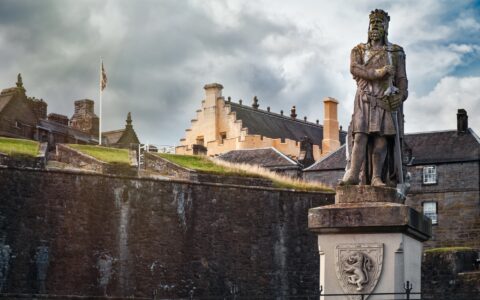Robert I, also known as Robert Bruce or Robert de Brus, is a hero of Scottish national history. Born in Turnberry in 1274, he was enthroned King of Scotland in 1306 and led his country to independence from the English until his death in 1329. His reign was marked by remarkable battles and major achievements that consolidated the nation as it exists today.

Robert the Bruce, Stiling castle – © kmiragaya
Robert the Bruce was born at Turnberry Castle in Scotland. He was the son of Robert the Bruce, 5th Lord of Annandale, and Marjorie, daughter of Walter FitzGilbert de Mar. He is the grandson of Robert the Bruce, 2nd Lord of Annandale, who was killed at the Battle of Otterburn in 1314.
Robert the Bruce received a refined education, which he supplemented with trips to France and Italy. He married Isabelle de Mar in 1296. The couple had two children, Marjorie and Robert.
In 1296, England invaded Scotland and deposed King John Balliol. Robert the Bruce was appointed guardian of Scotland, but was forced to submit to the English in 1302.
In 1306, Robert the Bruce was crowned King of Scotland in Scone. He immediately launched a resistance campaign against the English.
The conflict between the Scots and English continued for eight years after Robert Bruce’s coronation, culminating in four major victories for the Scottish king:
The Battle of Bannockburn is considered one of the most important battles in Scottish history. The Scottish army, led by Robert the Bruce, won a decisive victory over the English army, led by Edward II.
The victory at Bannockburn ensured Scottish independence. Robert the Bruce was recognized as King of Scotland by the international community.
In 1328, Edward III of England agreed a truce with Scotland and began negotiations to consolidate peace between the United Kingdom and Scotland. These discussions led to the so-called Treaty of Northampton, which was signed in May 1328, recognizing Robert Bruce as King of Scotland in his own right.
Although the treaty did not officially recognize Scotland’s complete independence from England, it was a major step towards the complete reconquest by Robert Bruce and his people. To mark this important event, he commissioned an open letter, known as the “Declaration of Arbroath”, addressed to Pope John XXII.
It asked the Vatican for international recognition of the independence of the Scottish kingdom.
During his late reign, Robert Bruce pursued resolutely pro-Scottish policies designed to modernize and centralize the government, making it stronger in the face of external threats. His greatest achievements include
In addition, he strongly encouraged the colonization of the sparsely populated lands of northeast Scotland, thus solidifying the kingdom’s position.
Robert the Bruce ruled Scotland for 13 years. He consolidated the country’s independence and introduced major reforms, notably in the areas of justice and administration.
Robert Bruce died on June 7, 1329 in Cardross (aged 54). His son David II succeeded him on the Scottish throne and became sovereign of the Scots.
But although his reign began in troubled times, David took up his father’s pro-Scottish policies and succeeded in further consolidating Scottish independence.
Despite the difficulties he had to go through to achieve his position, Robert Bruce has remained an important symbol for Scots, as a grateful national hero whose courage and perseverance will always be celebrated. In the end, Robert Bruce succeeded in winning not only freedom for his people, but a permanent place in the annals of Scottish history.